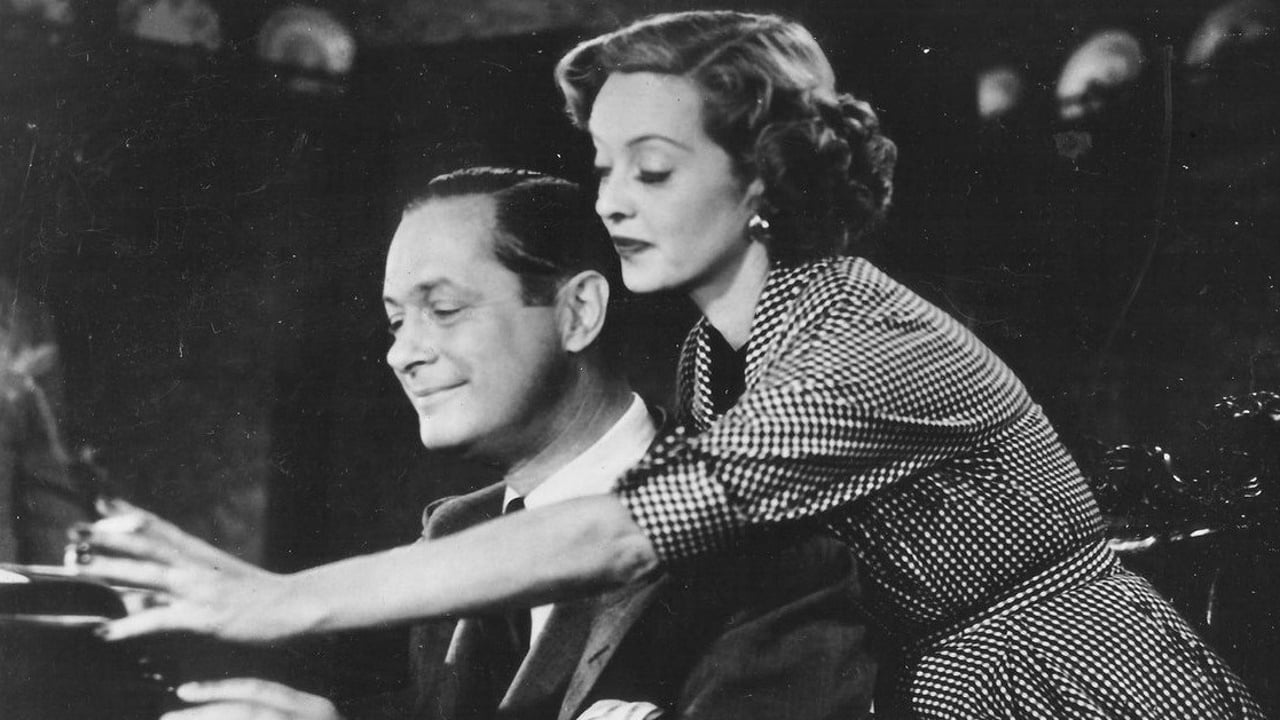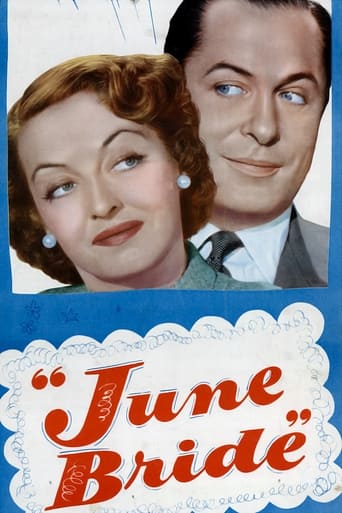

Bette Davis (Linda Gilman), Robert Montgomery (Carey Jackson), Fay Bainter (Paul Winthrop), Betty Lynn (Boo Brinker), Tom Tully (Brinker), Barbara Bates (Jeanne Brinker), Jerome Cowan (Carleton Towne), Mary Wickes (Rosemary McNally), James Burke (Luke Potter), Raymond Roe (Bud Mitchell), Marjorie Bennett (Mrs Brinker), Ray Montgomery (Jim Mitchell), George O'Hanlon (Scott Davis), Sandra Gould (Miss Rubens), Esther Howard (Mrs Mitchell), Jessie Adams (Mrs Lace), John Vosper (Stafford), Jack Mower (Varga), Lottie Williams (Woody), Mary Stuart (plane hostess), Ann Kimbell, Barbara Wittlinger (girls on sleigh ride), Raymond Bond (minister), Patricia Northrop, Alice Kelley, Debbie Reynolds (Boo's girlfriends).Directed by BRETAIGNE WINDUST. Screenplay by Ranald MacDougall. Based on the play Feature for June by Eileen Tighe and Graeme Lorimer. Photographed by Ted McCord. Musical score and direction by David Buttolph. Miss Davis' wardrobe by Edith Head. Art direction by Anton Grot. Edited by Owen Marks. Set decorator: William Wallace. Make-up: Perc Westmore assisted by Eddie Voight. Special effects directed by William McGann, photographed by Hans F. Koenekamp. Curlicue decorations: Harry Platt. Assistant director: Sherry Shourds. Sound recording: Robert B. Lee. Producer: Henry Blanke. Copyright 13 November 1948 by Warner Bros. Pictures, Inc. New York opening at the Strand: 29 October 1948. U.S. release: 13 November 1948. U.K. release: 20 June 1949. Australian release: 2 February 1950 (sic). 8,747 feet. 97 minutes.SYNOPSIS: Much to her chagrin, Linda Gilman (Bette Davis), editor of a slick women's magazine, learns from her publisher, Carleton Towne (Jerome Cowan), that Carey Jackson (Robert Montgomery), a wandering war correspondent who once wanted to marry her, has been hired as her assistant. Aware that Carey's anti-feminist ego will make him resign his new job, Linda assigns him to a story she knows he will dislike: accompanying her and a crew to the Brinker home in Indiana where she intends doing a layout for the June issue about a wedding in a typically middle-class home.NOTES: "Feature for June" was never produced on Broadway.COMMENT: For all their hot-shot image, showmen tend to be a pretty conservative bunch. Here's Bette Davis making her first comedy for seven years. So what do the showmen/exhibitors do? They run scared. Super-enthusiastic reviews, but how will Mr and Mrs Blow take to Bette in a comic cut-up? Better play safe. Don't risk June Bride on Saturday night.Maybe the exhibitors were right. Maybe "June Bride" is too clever for the masses. True, the plot is developed in a heavily telegraphed, predictable way, but it's an ingenious premise all the same. And while the acid satire of its opening sequences are not matched in the rest of the movie, the players do keep it interesting right up to the final curtain. All the players (most pointedly Tom Tully) are worth watching, and it's good to see Mary Wickes making the most of the double entendres.Anton Grot's masterly art direction deserved at least an Oscar nomination — but didn't get one.OTHER VIEWS: This ingratiating comedy is an obvious variant on The Man Who Came to Dinner. Thanks to a witty script, skillful direction, fine production values and above all a wonderfully agreeable assembly of seasoned players, there's plenty of life in the old farce yet. — G.A.Bette Davis hated working with Bob Montgomery on "June Bride". She complained that he hogged the camera and crabbed her close-ups. There is certainly no evidence of this in the finished film. If anything, Bette seems to have the best of the lighting and the most of the close-shots. Not that this matters much anyway, as both principals are miscast. Especially Bette. With an unbecoming hair style, dowdy clothes and far too emphatic make-up, she looks a sight; whilst her impassioned acting is far more suited to heavy melodrama than light comedy. At times she seems to be declaiming from some long-outmoded textbook on the Rights of Women.Surly, boorish Montgomery is only slightly less unattractive. At least his appearance looks more normal and the fact that he seems out of place is at least explained in the script. But his egotistical air, combined with his patent lack of charm, will hardly endear an audience, or warm any viewers to get sympathetically involved in his affairs.Some of the support players are not over-engaging either. In particular, Betty Lynn.Although director Windust does his best to keep things moving, what emerges is little more than a photographed stage play. And for all the technical expertise, the comedy for the most part seems forced and artificial. — JHR writing as Tom Howard.
... View MoreRobert Montgomery is not my favorite, but he does hold up his end in this film. The script is well-written, but the two stars have zero chemistry and Bette Davis appears ill, tired and disinterested in this part. She is noticeably thin and perhaps she was really ill. In any case, they are both too old for their roles.What saves this movie is the well-written script and Tom Tully's outdoor cider jug! Of course, any movie with Bette Davis is worth watching, and this one is no exception. I don't think comedy is really her forte anyway, and her performance and characterization strongly remind me of "The Man Who Came To Dinner" done several years before this one. That one, of course, is much better-written, and it puts Bette's character in a supporting role and makes more sense of her romantic situation. Even in 1950, would a successful magazine editor give up everything for a husband without a job?
... View MoreDavis had devastatingly funny moments in All About Eve and (in a sick kind of way) Whatever Happened to Baby Jane?, but her opportunities to do the kind of romantic comedy that stars such as Irene Dunne or Rosiland Russell made such a staple of their careers in the '30s and '40s were few. The deft and mostly delightful JUNE BRIDE was such an opportunity, and Bette is up to the task.The picture is a sort of working-class Philadelphia Story, with Davis as the all-business (but dryly witty) editor of a women's magazine who, with entourage in tow, invades and takes over the home of an Indiana family for a feature story on a typical American June bride....in the dead of winter (lead time, you know). Along for the ride is Davis' erstwhile sweetie, Robert Montgomery (father of Elizabeth), a foreign correspondent between assignments who's tapped by their publisher to punch up the story's copy, providing him the perfect opportunity for an attempt at rekindling his and Davis' failed relationship.This is the kind of role Montgomery did best: a cynical sophisticate with a hint of mischievous boy under the surface, and he and Davis work together smoothly. It's said she could be a tyrant on the set, but one thing Davis always deserved credit for was knowing when to relinquish the spotlight to other players. Those in doubt should consult The Man Who Came To Dinner or The Great Lie for proof. JUNE BRIDE is really Montgomery's picture more than anyone else's, and Bette graciously lets him walk away with it much of the time. Lending able support are familiar faces such as Fay Bainter, Tom Tully (who has some wonderful moments involving a problem with his wife's bust....of Caesar) and Mary Wickes (always in the right place at the right time for an acerbic remark).Davis seems right at home behind the desk in her chic (pronounced "chick" by the Indiana family) tailored suits, filling the shoes usually inhabited by someone like the aforementioned Russell. Released a couple of years before All About Eve, JUNE BRIDE is something of a thematic precursor to that film, inasmuch as a good deal of the plot hinges on the conflict between work and love for two professionals, delivered here in the tried and true romantic battle-of-the-sexes formula.Herein lies JUNE BRIDE's most glaring - I hate to say flaw, since it's the fault not of the picture so much as the era in which it was made - let's say jarring note: an ultimately sexist viewpoint. This is an element that wouldn't have slapped viewers in the face in 1948 as it does today - at least not as hard - and it rears its ugly head only toward the film's end; an unfortunate place for it, as we're left with this bit of "attitude" after it's over. One just has to shrug, and recall that this was the postwar era, when even the U.S. government threw in its two cents by producing little "public service" films encouraging women to give up the jobs they had held during the war because, well, the boys were home, they needed work and it was high time American Womanhood was back in the kitchen (I kid you not).This bitter little pill is easily overlooked under all that sweet candy coating, so JUNE BRIDE is an enjoyable confection, and a quite amusing way to spend an hour and a half. It's a shame Davis didn't do more like it.
... View MoreI was looking forward to this movie..... Since, I heard all the praise on this site..... Needless to say, I was disappointed, and I think it was because I had expectation in Bette Davis's acting, and even though this is the first comedy, I've seen her in...... I thought, she could pull it off...... Throughout the movie, Bette acts as though she was in a drama, instead of a comedy..... She says her lines, in absolute witless, and charmless style...... Instead, in a serious, grouchy kind of manner...... (which is her usual style) Overall, Bette's acting was too serious, and her face was hardened most of the time...... She could've eased up a lot...... I have heard comments, that say neither Bette Davis, or Joan Crawford could do comedy...... Believe me, Joan Crawford apparently, has more comedic talent than Bette Davis...... Joan may not be the best comedy actress, but she does displays charm, and wittiness fairly well in her comedic roles....... Robert Montgomery did well, and provided most (all) of the charm, and humor in this movie, next to the stoned Bette Davis...... Their chemistry together was okay...... Though, I must admit, they appear rather odd as a couple...... I think, we'll all prefer that Bette sticks to her dramatic roots......
... View More